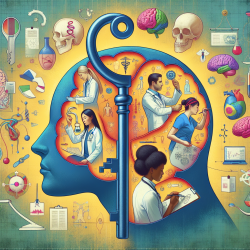As a Special Education Director, I'm always on the lookout for innovative solutions that can support our students' mental health. One such promising approach is the use of mobile health (mHealth) applications, which have shown potential in improving adolescent well-being. A recent study titled Promoting Daily Well-being in Adolescents using mHealth sheds light on how these digital tools can be leveraged to enhance emotional resilience among young people.
The Role of mHealth in Mental Health Support
mHealth apps are designed to provide accessible mental health support without geographical or financial barriers. They often incorporate elements of cognitive behavioral therapy (CBT), which is a proven method for managing mental health issues by addressing maladaptive thoughts and behaviors.
The Grow It! app is an example of an mHealth intervention that uses CBT-inspired challenges and Experience Sampling Methods (ESM) to help adolescents improve their emotional self-awareness and coping skills. This app encourages users to engage in daily activities that promote positive thinking and problem-solving, thereby fostering adaptive coping mechanisms.
Understanding the Research Findings
The study involved two cohorts of Dutch adolescents aged 12-25 who used the Grow It! app during stressful periods like the COVID-19 pandemic. The findings revealed that while there was an average decrease in daily positive affect and adaptive coping, a significant portion of participants experienced improvements in these areas.
- 64.7-72.0% of adolescents showed an increase in positive affect.
- 81.6-82.6% experienced a decrease in negative affect.
This suggests that despite the overall challenging context, many adolescents benefited from the app's interventions, highlighting its potential as a preventive tool for mental health issues.
Implementing mHealth Strategies in Practice
For practitioners looking to incorporate mHealth solutions into their practice, here are some key takeaways from the study:
- Focus on Adaptive Coping: Encourage adolescents to engage with activities that promote social support, self-acceptance, and problem-solving.
- Utilize ESM Techniques: Implement methods for real-time monitoring of emotions to help students gain insights into their emotional patterns.
- Personalize Interventions: Tailor challenges and activities to meet individual needs and preferences to enhance engagement and effectiveness.
The Path Forward: Encouraging Further Research
The study's findings underscore the importance of continued research into mHealth interventions. By exploring different approaches and refining existing tools like the Grow It! app, we can better support adolescents' mental health during critical developmental periods.
I encourage fellow practitioners and educators to stay informed about advancements in this field through conferences, publications, and webinars. Networking with peers can also provide valuable insights and opportunities for collaboration in implementing these innovative strategies.
To read the original research paper, please follow this link: Promoting Daily Well-being in Adolescents using mHealth.










